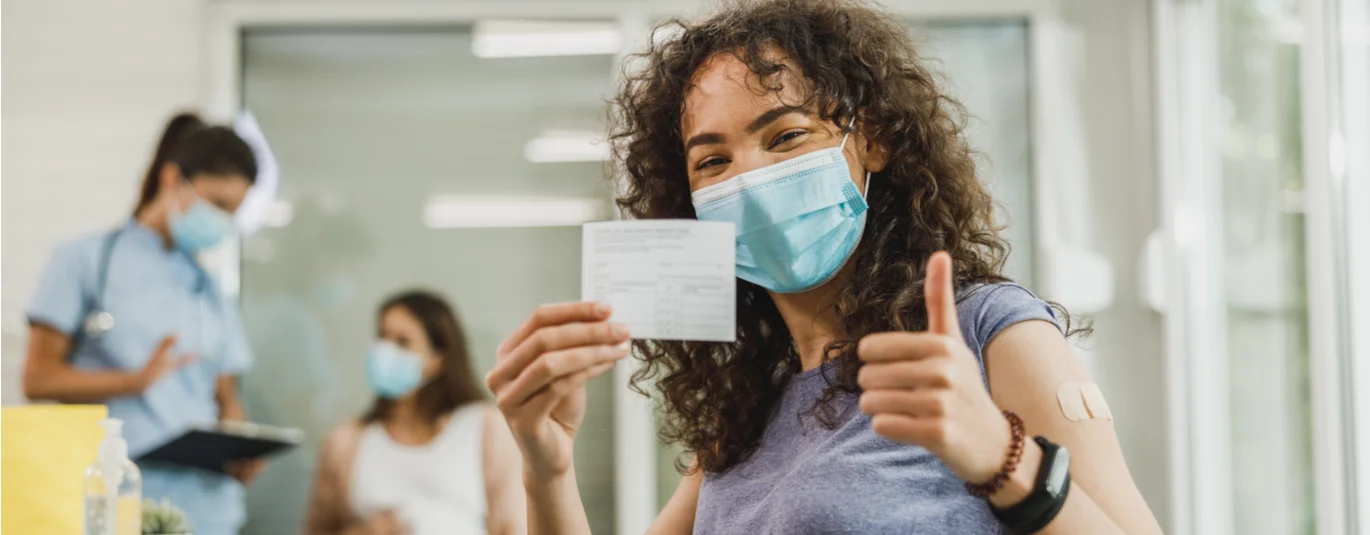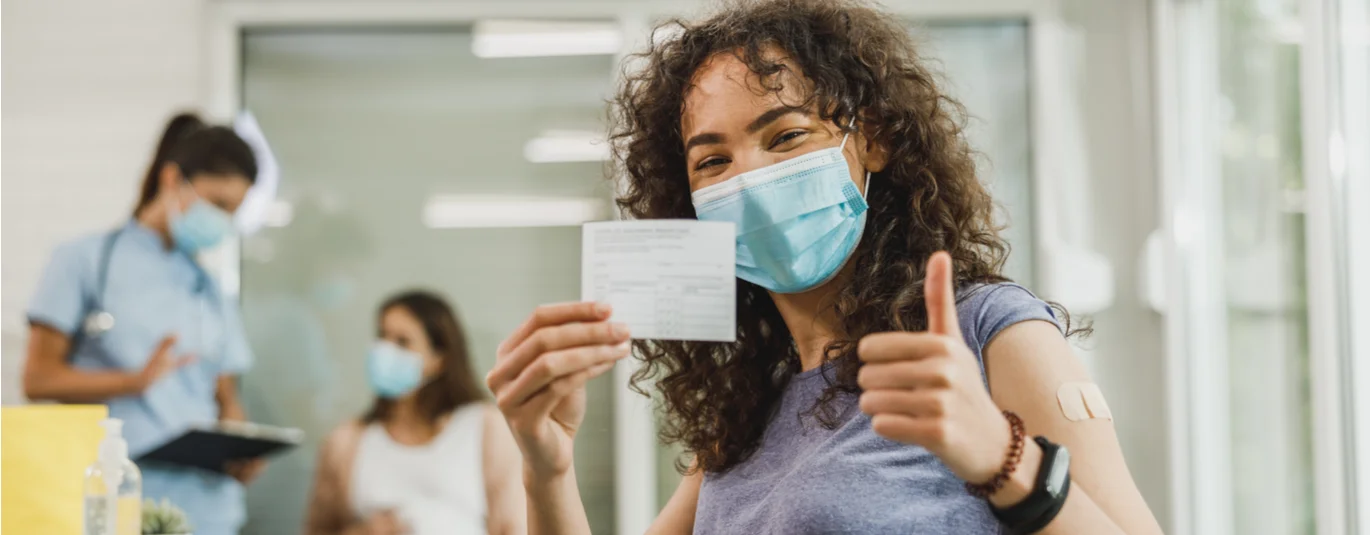

Parents’ Questions, Answered
By now, you probably know that COVID-19 vaccines are available to kids and teens 12 and up.1 For many of us, the choice to get vaccinated was fairly straightforward. Making that choice for our kids, however, may feel more complicated.We want to help you find the information you need to make that decision. As always, we recommend talking to your child’s pediatrician if you have any questions or concerns.
Are COVID-19 vaccines safe for kids and teens?
Yes. The CDC and the FDA have determined that COVID-19 vaccines are safe and effective for this age group.1 Scientists are continuing to monitor safety in adolescents.In studies, the Pfizer vaccine was found to be 100% effective in preventing COVID-19 in kids 12-15.2
What side effects could my child have?
As with any vaccine or medication, COVID-19 vaccines may come with a few side effects. This is true for both kids and adults. For the most part, kids are experiencing similar side effects as adults. This may include: 3
Pain, redness, and swelling on the arm where they got the shot
Tiredness
Headache
Muscle pain or aches
Chills
Fever
Nausea
While many who receive the vaccine don’t experience side effects at all, some report feeling generally “flu-ish” after their first or second dose of the vaccine. This is normal and nothing to be concerned about.4 To combat flu-ish symptoms, the CDC recommends staying hydrated by drinking plenty of fluids and dressing lightly. While these side effects will go away on their own within a few hours or days, be sure your child gets lots of rest to help the healing process. This might be a good time for them to finish up that season of TV they’ve been binging on Netflix or finally pick up that book they’ve been meaning to read.Remember, these side effects are just signals that your child’s body is doing its job by building up a defense against COVID-19.You may have heard on the news that some kids have developed myocarditis, or inflammation of the heart, after vaccination. Though the risk is quite low, this is an understandable worry for parents. For more information on that, visit Harvard Health.If your child has a history of severe allergic reactions to vaccines, or if you have any other safety concerns, talk to your child’s doctor. Also important to note, adolescents are more likely to faint after many vaccines—likely because of fear or pain.5 As for long-term side effects, the CDC says this is extremely unlikely. In the millions of people vaccinated, no long-term side effects have been detected.6
I thought kids couldn’t get severe illness. Why should I think about vaccinating them?
Whether you vaccinate your kids is a personal choice. It’s true that kids often have milder COVID-19 symptoms than adults.7 But it’s important to know that some kids can get very sick from COVID-19.8 At least 450 children have died of the virus.9 In 2021, we’ve seen a significant increase in the percentage of kids diagnosed with the virus.10 This matters for a few reasons.For one, the more children get infected, the more we will see serious complications that can be dangerous for kids.10 And for another, kids are highly likely to transmit COVID-19 to others.11 The more we allow the virus to spread, the more likely we are to see even more dangerous variants emerge.Plus, getting a COVID-19 vaccine can give both kids and parents the peace of mind to know they are protected from the virus as they return to all the activities they enjoy. The vaccine opens up safe opportunities to get back to camps, sports, school and other gatherings.Getting vaccinated is an important step in stopping the pandemic for both kids and adults.
Need to learn more about healthcare coverage? Hit the button below to contact the Health Plans of NC agent on this webpage.
Ready to get started?
Related Articles

Why I Chose To Get The COVID-19 Vaccine: One Army Doctor Speaks Out
Dr. Minogue has been practicing medicine for nearly 30 years. He is a medical director at Blue Cross and Blue Shield of North Carolina. He works part-time in the Durham Veteran Affairs Emergency Department. Dr. Minogue also serves in the Army Reserve as an emergency medicine doctor and a volunteer at Samaritan Health Center, a clinic for the underserved in our community.
As a health care professional, Dr. Minogue was one of the first North Carolinians vaccinated in December 2020. Here’s what he shared about his decision to get the COVID-19 vaccine.
Charlene Macielag via Blue Cross NC

Get The Facts About COVID-19 Vaccines: 5 Rumors Debunked
It’s reasonable to have concerns about a new vaccine.
To help you separate fact from fiction, Blue Cross and Blue Shield of North Carolina Medical Directors are breaking down some of the most common myths.
Blue Cross NC

Top 10 Myths About Childhood Vaccines
The effects of this are all too well known. As recently as December of 2014, we saw an outbreak of Measles that affected over a hundred children as a result of unvaccinated children and adults. All of which could have been avoided with proper preventative care.
Unfortunately, there are many myths about vaccines that encourage or frighten parents into not vaccinating their children, and as a result, infections can easily spread among the unvaccinated. I want to take a few minutes to share some of the most commons myths about childhood vaccines and talk about the facts.
Dr. Larry Wu

Fear Of COVID-19 Vaccines Is Real - Should It Be?
When I listened to my relative speak, I could hear the fear in her voice. And it was real.
Of course, there are a lot of other reasons why people aren’t getting vaccinated. They’re making a political statement, they don’t have easy access to the vaccine, or they just don’t like being told what to do. But for millions of people, the number one roadblock is fear. But what’s driving that fear?
By Emilie Poplett via Blue Cross NC

Prepare For The Dual Hit Of Flu & COVID-19
It’s especially troubling since people may be postponing their annual physicals or putting off regular vaccinations. But getting your flu shot is one way to protect yourself – and others – this winter.
COVID-19 vs. influenza: What’s the difference?
Dr. Larry Wu

No Flu For You: 5 Flu Shot Myths Debunked
Maybe you’re ready to go and are rushing to Target because they’re offering discounts to shoppers who get the flu shot as an incentive. Great! You know the importance of getting the flu shot, not just for yourself but for your loved ones, too.
But maybe you’re not so ready. Maybe you’ve heard something that’s swayed your opinion this year. Something that scared you or made you think twice. We get it. Every year rumors circulate about getting vaccinated, from the outlandish to the plausible. And it’s hard to know what’s true and what’s not, especially in this age of lightning fast communications.
Allison Bonner